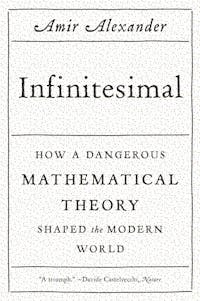Infinitesimal: How a Dangerous Mathematical Theory Shaped the Modern World
 Download image
Download image
ISBN10: 0374534993
ISBN13: 9780374534998
Trade Paperback
368 Pages
$20.00
CA$27.00
On August 10, 1632, five leaders of the Society of Jesus convened in a somber Roman palazzo to pass judgment on a simple idea: that a continuous line is composed of distinct and limitlessly tiny parts. The doctrine would become the foundation of calculus, but on that fateful day the judges ruled that it was forbidden. With the stroke of a pen they set off a war for the soul of the modern world.
Amir Alexander's Infinitesimal is the story of the struggle that pitted Europe's entrenched powers against voices for tolerance and change. It takes us from the bloody religious strife of the sixteenth century to the battlefields of the English civil war and the fierce confrontations between leading thinkers like Galileo and Hobbes. We see how a small mathematical disagreement became a contest over the nature of the heavens and the earth: Was the world entirely known and ruled by a divinely sanctioned rationality and hierarchy? Or was it a vast and mysterious place, ripe for exploration? The legitimacy of popes and kings, as well as our modern beliefs in human liberty and progressive science, hung in the balance; the answer hinged on the infinitesimal.
Pulsing with drama and excitement, Infinitesimal will forever change the way you look at a simple line—and celebrates the spirit of discovery, innovation, and intellectual achievement.
Reviews
Praise for Infinitesimal: How a Dangerous Mathematical Theory Shaped the Modern World
"Bertrand Russell once wrote that mathematics had a ‘beauty cold and austere.' In this new book, the historian Amir Alexander shows that mathematics can also become entangled in ugliness hot and messy. The time was the late 16th and 17th centuries, and the mathematics in question was the proper understanding of continua—straight lines, plane figures, solids . . . This fascinating narrative by Dr. Alexander (an occasional book reviewer for Science Times) vivifies the era and the fault lines that the mathematical dispute revealed . . . [A] finely detailed, dramatic story."—John Allen Paulos, The New York Times
"Alexander tells this story of intellectual strife with the high drama and thrilling tension it deserves, weaving a history of mathematics through the social and religious upheavals that marked much of the era . . .The author navigates even the most abstract mathematical concepts as deftly as he does the layered social history, and the result is a book about math that is actually fun to read. A fast-paced history of the singular idea that shaped a multitude of modern achievements."—Kirkus Reviews (starred review)
"[Infinitesimal] gives readers insight into a real-world Da Vinci Code–like intrigue with this look at the history of a simple, yet pivotal, mathematical concept . . . Alexander explores [a] war of ideas in the context of a world seething with political and social unrest. This in-depth history offers a unique view into the mathematical idea that became the foundation of our open, modern world."—Publishers Weekly
"A gripping account of the power of a mathematical idea to change the world. Amir Alexander writes with elegance and verve about how passion, politics, and the pursuit of knowledge collided in the arena of mathematics to shape the face of modernity. A page-turner full of fascinating stories about remarkable individuals and ideas, Infinitesimal will help you understand the world at a deeper level."—Edward Frenkel, Professor of Mathematics, University of California, Berkeley, and author of Love and Math
"In this fascinating book, Amir Alexander vividly re-creates a wonderfully strange chapter of scientific history, when fine-grained arguments about the foundations of mathematical analysis were literally matters of life and death, and fanatical Jesuits and English philosophers battled over the nature of geometry, with the fate of their societies hanging in the balance. You will never look at calculus the same way again."—Jordan Ellenberg, Professor of Mathematics, University of Wisconsin–Madison, and author of How Not to Be Wrong
"You may find it hard to believe that illustrious mathematicians, philosophers, and religious thinkers would engage in a bitter dispute over infinitely small quantities. Yet this is precisely what happened in the seventeenth century. In Infinitesimal, Amir Alexander puts this fascinating battle in historical and intellectual context."—Mario Livio, astrophysicist, Space Telescope Science Institute, and author of Brilliant Blunders
"With considerable wit and unusual energy, Amir Alexander charts the great debate about whether mathematics could be reduced to a rigorous pattern of logical and orderly deductions or whether, instead, it could be an open-ended and exciting endeavor to explore the world's mysteries. Infinitesimal shows why the lessons of mathematics count so much in the modern world."—Simon Schaffer, Professor of the History of Science, University of Cambridge
"In Infinitesimal, Amir Alexander offers a new reading of the beginning of the modern period in which mathematics plays a starring role. He brings to life the protagonists of the battle over infinitesimals as if they were our contemporaries, while preserving historical authenticity. The result is a seamless synthesis of cultural history and storytelling in which mathematical concepts and personalities emerge in parallel. The history of mathematics has rarely been so readable."—Michael Harris, Professor of Mathematics, Columbia University and Université Paris Diderot
"We thought we knew the whole story: Copernicus, Galileo, the sun in the center, the Church rushing to condemn. Now this remarkable book puts the deeply subversive doctrine of atomism and its accompanying mathematics at the heart of modern science."—Margaret C. Jacob, Distinguished Professor of History, University of California, Los Angeles



